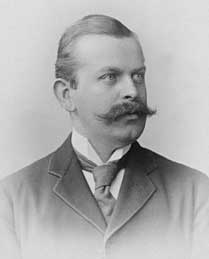| Profile | Major Works | Resources |
Karl Diehl, 1864-1943.
German economist, associated with the last generation of the German Historical School, at Freiburg.
Originating from Frankfurt, Karl Diehl studied at the universities of
Jena and Halle, studying economics under Johannes
Conrad and coming under the influence of the Kantian legal
philosopher Rudolf Stammler. After obtaining his doctorate in 1888,
Diehl worked as a teacher in Vienna, while completing and completing his
habilitation, which was submitted to Halle in 1890.
Diehl stayed on as a privat-dozent (assistant), and obtained the
position of extraordinary (associate) professor at Halle in 1893. Diehl
obtained the full professor chair at the University of Rostock in 1898,
but stayed for only a year before taking the chair at Köningsberg in
1899.
In 1908, Karl Diehl became professor at the University of Freiburg.
Karl Diehl took an early but critical interest in the history of socialist economic thought. Among his contributions was an extensive study of the anarchist leader Michel Proudhon (1888) and a supportive critique of Marx's theory of value (1898). Diehl also undertook an extensive study of David Ricardo as an economic theorist (1905).
Karl Diehl is also considered the founder and leader of the "Social Law" (Sozialrecht) school in Germany, a predecessor of the law-and-economics movement. Inverting the Marxian formula, Diehl asserted the primacy of law in determining economic relations, that it is legal tradition that sets the views about contract and efficiency, which frames how the economy works. As a result, Diehl believed economic ideas could and should be used to change and shape the law, to achieve the desired economic outcomes.. He drew much of his inspiration from the Kantian legal philosopher Rudolf Stammler..
|
Major Works of Karl Diehl
|
|
HET
|
|
Resources on Karl Diehl
|
All rights reserved, Gonçalo L. Fonseca

